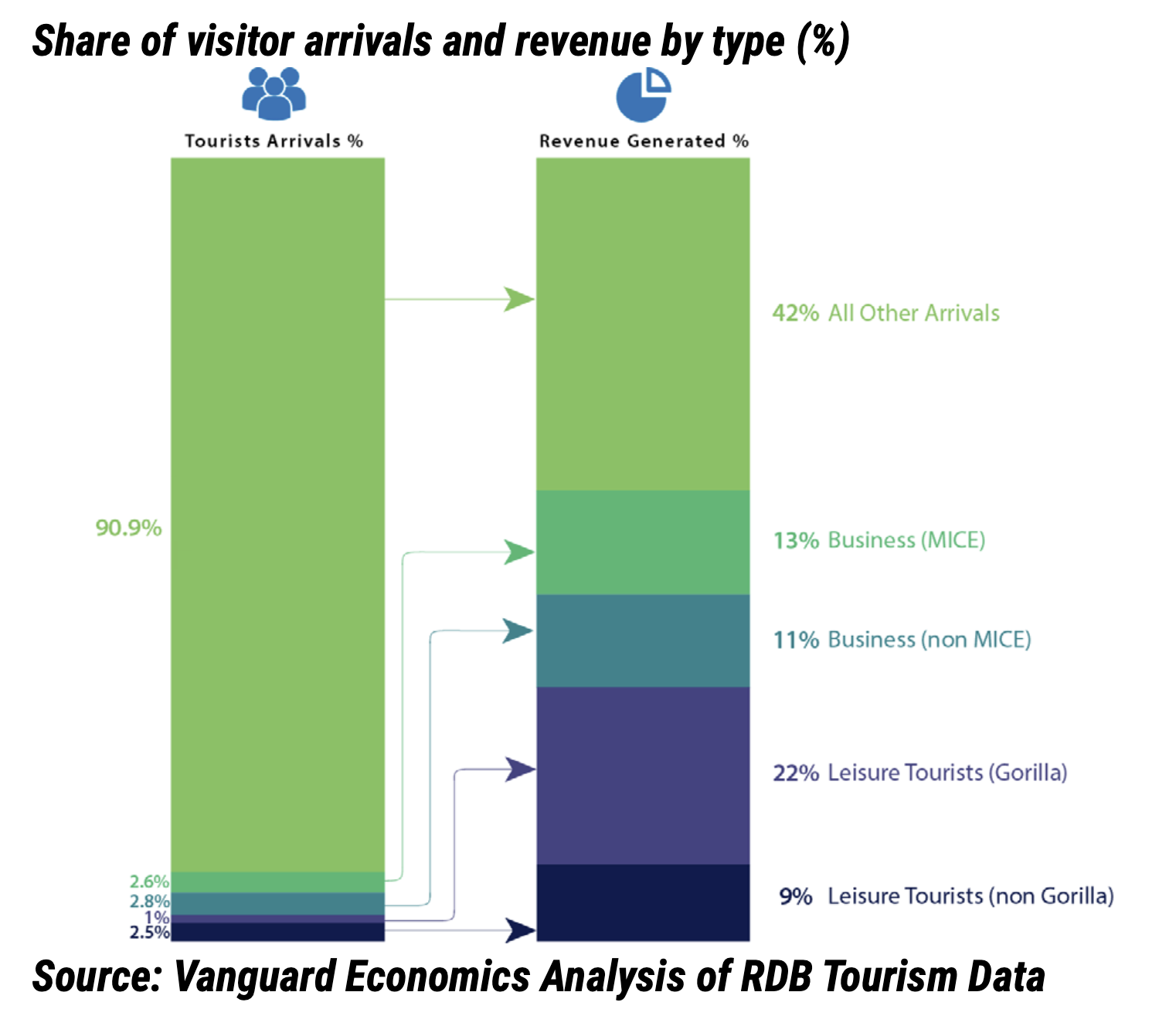Covid-19 has hit Rwanda’s tourism sector hard. Can a small share of visitors help the sector get back on track?
Rwanda’s seven-year National Strategy for Transformation (NST) 2017-2024, commits the government to doubling tourism revenue from US$ 404 million in 2016 to US$ 800 million by 2024. Pre-pandemic, the sector was well on its way to achieving this target generating just under US$ 500 million in 2019 and average annual growth of 8.4% between 2017 and 2019. These results were achieved thought a range of interventions:
- Diversification of leisure tourism and a focus on tourism spend over tourism volume. A bold shift to- ward high value tourism included a doubling of Go- rilla permit prices from US$750 to US$ 1,500 in May 2017. This move was done to boost already existing conservation efforts, develop local communities and coincided with large-scale public and private invest- ment in Akagera, Nyungwe and Volcano National Parks along with diversification of offer along the Lake Kivu Belt;
- Investments in the MICE (Meetings, Incentives, Con- ferences and Exhibitions) strategy has catapulted Rwanda to the forefront of conference tourism in Africa. The country has hosted the African Union Sum- mit, the World Economic Forum for Africa and the African Development Bank annual meetings among others, with the Commonwealth Heads of Government Meeting slated for June 2021. These efforts have been recognized by international bodies such as the International Congress and Convention Association which ranked Rwanda 2nd as a leading MICE destination in Africa in 2019 & 2020;
- Strategic marketing under the #VisitRwanda brand, (Arsenal Football Club’s official tourism partners and shirt sleeve sponsor) has positioned Rwanda as a global luxury tourism destination;
- Rwandair has emerged as one of the fastest growing airlines on the continent flying to 28 destinations across 3 continents with plans to fly to New York and Brazil in the pipeline increasing Rwanda’s connectivity to the world.
- Despite these efforts, in 2020, tourism revenue dropped by 76% and visitor arrivals by 70% as Covid-19 took its toll on the global travel industry. Under some scenarios, the tourism sector might only recover to pre-pandemic levels by 2024.
Vanguard Economics carried out an analysis of 2019 revenue to understand where value was being generated in the tourism sector and identify potential paths to recovery. Our analysis of tourism data indicates that a small percentage of numbers generate a disproportionate share of revenue from the sector. For example, in 2019,
Gorilla tourists accounted for just 1% of arrivals but generated an estimated 22% of the total tourism revenue recorded that year. Similarly, MICE travelers made up just 2.6% of travelers but generated 13% of revenue.
The analysis shows that Rwanda may be able to rapidly return to pre-pandemic levels of tourism revenue generation if it can attract a modest number of high value travelers.

With the gradual easing of lockdown measures, the Government put in place measures to ensure the safety of visitors, especially those visiting national parks. International visitors are required to present negative Covid-19 PCR tests on arrival, take another test on arrival while waiting for their results in designated hotels. In addition to these measures, negative PCR test results are required at the entrance of national parks and at check-in desks across hotels.
In February 2021, the Rwanda Biomedical Center began vaccinating high-risk individuals and in March, rolled out a wider campaign. Among those vaccinated in the initial campaign were workers in the tourism ecosystem including park rangers, hotel staff and tour operators. In addition, all staff from the national airline Rwandair were vaccinated, making it the first airline on the continent to do so. The country is in line to achieve its target of 60% COVID-19 vaccination, reaching herd immunity by 2022.
The pandemic has altered the landscape of tourism as we know it. Travelers are switching popular high-density destinations for less crowded remote destinations according to a 2020 report by the World Travel and Tourism Council. Similarly, it is expected that leisure luxury travel will recover faster than corporate travel which gives Rwanda an idea of where to focus efforts to revive the industry.
References:
World Travel and Tourism Council, 2020. To Recovery and Be- yond. The Future of Travel & Tourism in the Wake of COVID-19.
Mckinsey, 2020. For Corporate Travel, a Long Road Ahead. RDB 2020. Tourism Visitor Data for 2020

